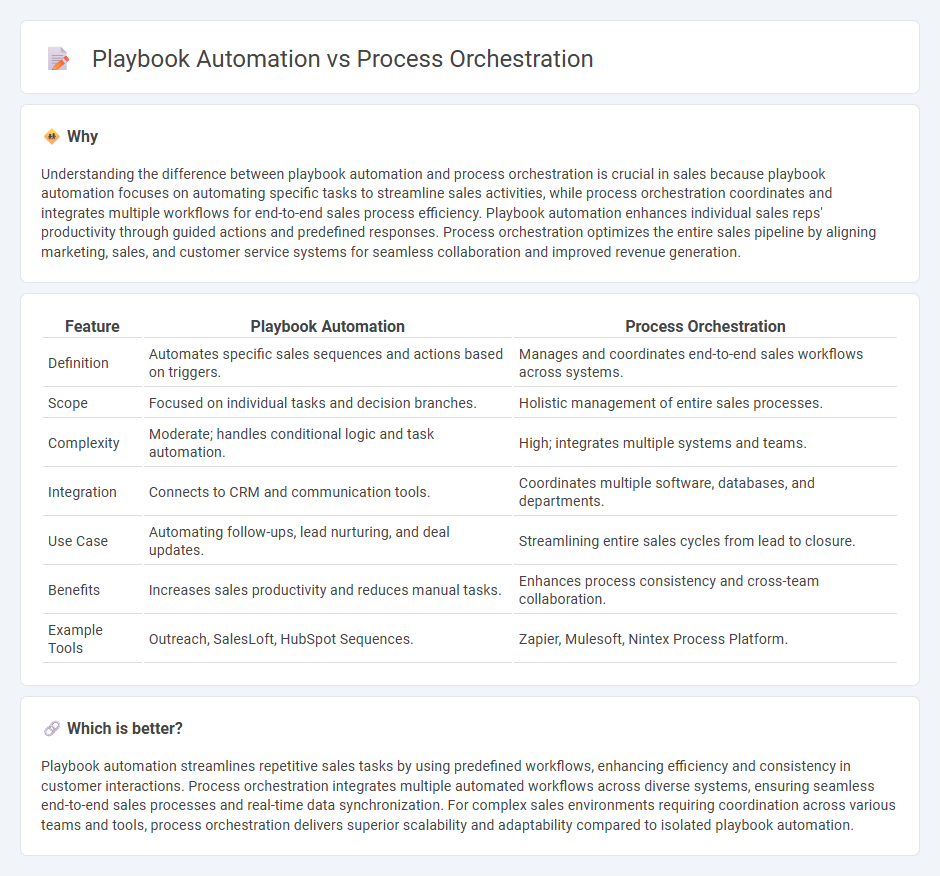
Sales playbook automation streamlines routine tasks such as lead qualification, follow-ups, and reporting by leveraging AI and CRM integrations to boost efficiency and consistency. Process orchestration connects multiple sales systems and workflows, ensuring data flows seamlessly across different platforms to enhance collaboration and optimize the sales cycle. Discover how integrating these strategies can transform your sales operations and drive revenue growth.
Why it is important
Understanding the difference between playbook automation and process orchestration is crucial in sales because playbook automation focuses on automating specific tasks to streamline sales activities, while process orchestration coordinates and integrates multiple workflows for end-to-end sales process efficiency. Playbook automation enhances individual sales reps' productivity through guided actions and predefined responses. Process orchestration optimizes the entire sales pipeline by aligning marketing, sales, and customer service systems for seamless collaboration and improved revenue generation.
Comparison Table
| Feature | Playbook Automation | Process Orchestration |
|---|---|---|
| Definition | Automates specific sales sequences and actions based on triggers. | Manages and coordinates end-to-end sales workflows across systems. |
| Scope | Focused on individual tasks and decision branches. | Holistic management of entire sales processes. |
| Complexity | Moderate; handles conditional logic and task automation. | High; integrates multiple systems and teams. |
| Integration | Connects to CRM and communication tools. | Coordinates multiple software, databases, and departments. |
| Use Case | Automating follow-ups, lead nurturing, and deal updates. | Streamlining entire sales cycles from lead to closure. |
| Benefits | Increases sales productivity and reduces manual tasks. | Enhances process consistency and cross-team collaboration. |
| Example Tools | Outreach, SalesLoft, HubSpot Sequences. | Zapier, Mulesoft, Nintex Process Platform. |
Which is better?
Playbook automation streamlines repetitive sales tasks by using predefined workflows, enhancing efficiency and consistency in customer interactions. Process orchestration integrates multiple automated workflows across diverse systems, ensuring seamless end-to-end sales processes and real-time data synchronization. For complex sales environments requiring coordination across various teams and tools, process orchestration delivers superior scalability and adaptability compared to isolated playbook automation.
Connection
Playbook automation streamlines sales workflows by automating repetitive tasks, while process orchestration integrates and manages these workflows across multiple platforms and teams. Together, they enhance sales efficiency by ensuring consistent execution and real-time coordination of sales activities. This connectivity reduces manual errors and accelerates deal closure rates.
Key Terms
Workflow Integration
Process orchestration centralizes multiple automated tasks across systems to create seamless end-to-end workflows, optimizing productivity and reducing manual intervention. Playbook automation focuses on predefined sequences of automated steps tailored for specific scenarios, often used in incident response or IT operations to standardize actions. Explore how integrating both approaches can enhance workflow efficiency and reliability in your enterprise.
Guided Procedures
Process orchestration coordinates multiple automated tasks across diverse systems to achieve end-to-end workflow execution, while playbook automation uses predefined sequences of actions to respond to specific incidents or events. Guided procedures enhance playbook automation by providing step-by-step instructions that ensure consistency and compliance during manual interventions within automated processes. Explore how integrating guided procedures improves efficiency and accuracy in your automation strategies.
Dynamic Adaptation
Process orchestration enables dynamic adaptation by coordinating multiple automated tasks across systems, ensuring seamless workflow adjustments in real-time based on event triggers and changing conditions. Playbook automation executes predefined sequences of actions for specific incident responses but offers limited flexibility for on-the-fly modifications during execution. Explore the nuances and benefits of dynamic adaptation in process orchestration versus playbook automation to enhance your automation strategy.
Source and External Links
What is process orchestration? A complete guide - Process orchestration is a set of tools that automates and manages workflows across systems and applications by defining task order, coordinating resources, and maintaining data flow, with challenges including integration, scalability, and maintenance.
What is Process Orchestration? - Process orchestration is a technology that connects, coordinates, and optimizes business processes involving people, systems, AI, and automation tools for seamless workflow execution and real-time visibility.
What is process orchestration? (2025) - Process orchestration manages the flow of work between humans and digital teams across an operation, enabling end-to-end process design and management, emphasizing workflow assessment, platform selection, automation, data security, and team collaboration.
 dowidth.com
dowidth.com